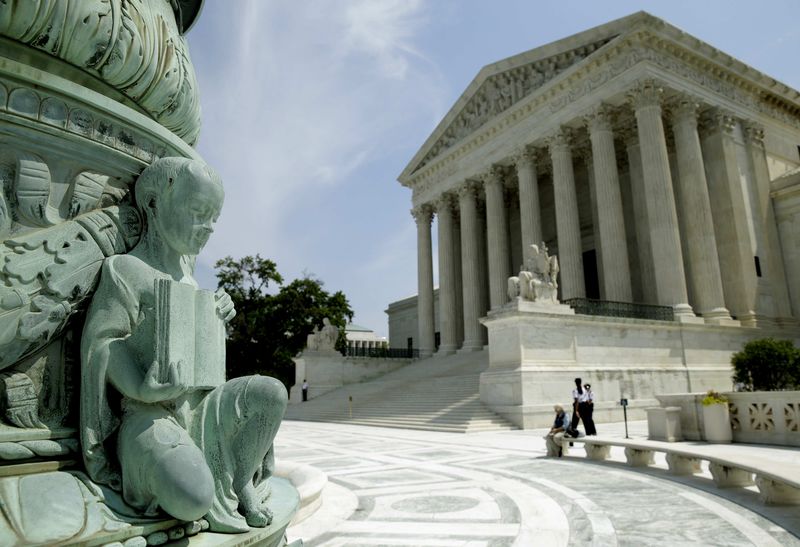By Lawrence Hurley
WASHINGTON (Reuters) - A divided U.S. Supreme Court on Thursday embraced a broad interpretation of discrimination claims allowed under the landmark Fair Housing Act, a blow to lenders and insurers that face such lawsuits and had urged the court to curb them.
In a 5-4 decision in a major civil rights case out of Texas, the court preserved a legal tool that has been used for decades to bring bias lawsuits over actions that have a discriminatory effect even with no evidence of discriminatory intent.
The unexpected ruling was a triumph for civil rights activists, who had feared the justices would rein in these lawsuits, and the administration of President Barack Obama, which had asked the justices to allow such claims to continue.
Justice Anthony Kennedy, a conservative who often casts the deciding vote in close cases, joined the court's four liberals in the majority.
"By recognizing that laws, policies and practices with unjustified discriminatory effects are inconsistent with the Fair Housing Act, today's decision lends support to hard-working Americans who are attempting to find good housing opportunities for themselves and their families," U.S. Attorney General Loretta Lynch said.
The case involved Inclusive Communities Project Inc, a nonprofit group that claimed Texas violated the law by disproportionately awarding low-income housing tax credits to developers owning properties in poor, minority-dominated neighborhoods. The group works to place low-income tenants in the more wealthy, majority white suburbs of Dallas.
The Texas case was closely watched by lenders and insurance companies, which say they are unfairly targeted. Industry groups say companies use neutral criteria when assessing risk. Based on how the law has been interpreted for decades, lawsuits could be filed over legitimate business practices, they argue.
Although a broad win for civil rights advocates on the legal theory, Kennedy, writing for the court, indicated in the ruling that the Texas plaintiffs ultimately could lose when the case returns to lower courts.
The court was considering whether the 1968 law allows for "disparate impact" claims in which plaintiffs need to show only the discriminatory effect of a particular practice and not evidence of discriminatory intent. There was no dispute over the law's prohibition on openly discriminatory acts in the sale and rental of housing.
For decades, disparate impact claims have been a way for lawyers representing blacks and other minorities to target policies that do not directly discriminate yet have the effect of putting certain groups at a disadvantage.
Kennedy wrote that Congress indicated in 1988 when it amended the law that it intended disparate impact claims to be available.
"It permits plaintiffs to counteract unconscious prejudices and disguised animus that escape easy classification," Kennedy added.
Kennedy also made clear there are limits to the types of claims allowed, saying "statistical disparity" alone is not enough. Plaintiffs must "point to a defendant's policy or policies causing that disparity," Kennedy added.
'INEFFECTIVE AND UNFAIR'
The disparate impact theory is opposed by business interests because it allows for a broad range of business decisions related to housing to be subject to civil rights litigation.
"Discrimination has no place in the United States, and the government should be equipped to hold accountable those who practice it. However, disparate impact is ineffective and unfair, and will ultimately harm those it is intended to protect," said David Hirschmann, president of the U.S. Chamber of Commerce's Center for Capital Markets Competitiveness.
Hirschmann welcomed what he called "severe limitations" imposed by the court on what kind of claims can be made.
Justice Samuel Alito wrote in a dissenting opinion that the ruling will "have unfortunate consequences for local government, private enterprise, and those living in poverty."
Alito cited an earlier case in which what he called a city's good faith attempt to fix "deplorable housing conditions" for renters was subjected to a legal challenge under the theory.
National civil rights groups had tried to keep the issue away from the conservative-leaning high court. In the past three years, two other cases that raised the same question about the scope of fair-housing law were taken up by the high court but settled with the help of the rights groups before the justices could rule.
Under Chief Justice John Roberts' leadership, a five-justice conservative majority previously had curtailed remedies for race discrimination in a series of cases involving federal voting rights, promotion tests for firefighters and integration plans designed to balance out whites and blacks throughout a school district and offset segregated housing.
"The way to stop discrimination on the basis of race is to stop discriminating on the basis of race," Roberts wrote in 2007.

The case is Texas Department of Housing and Community Affairs v. Inclusive Communities Project, U.S. Supreme Court, No. 13-1371.